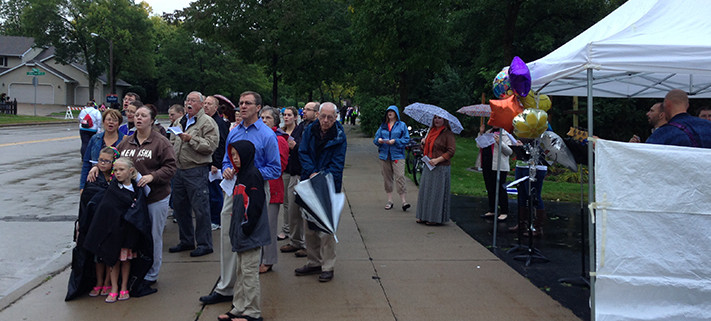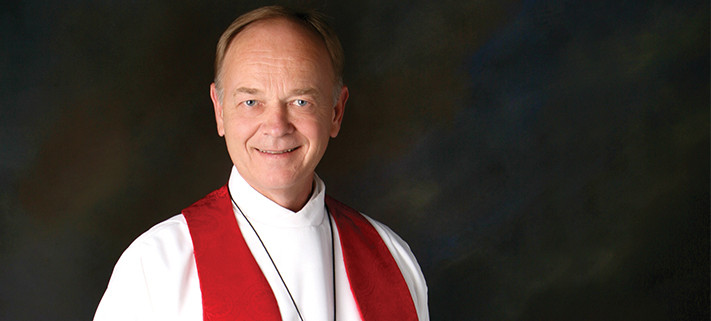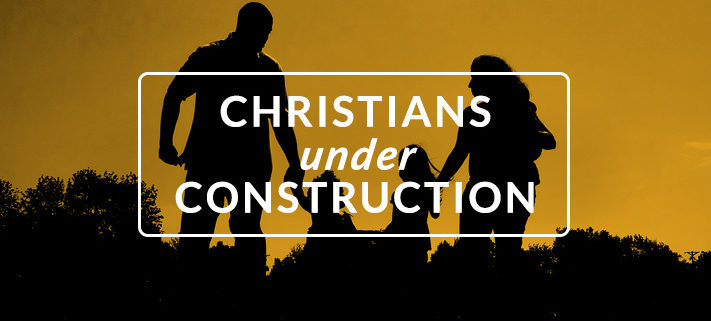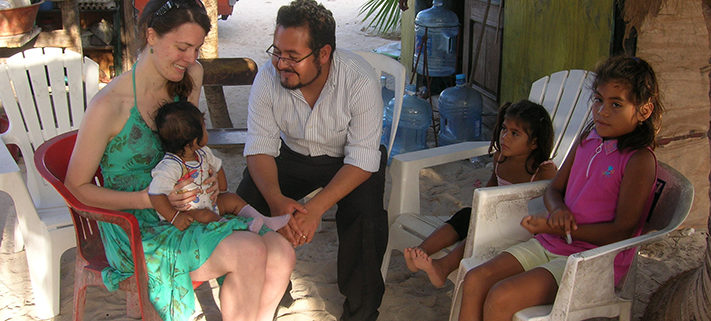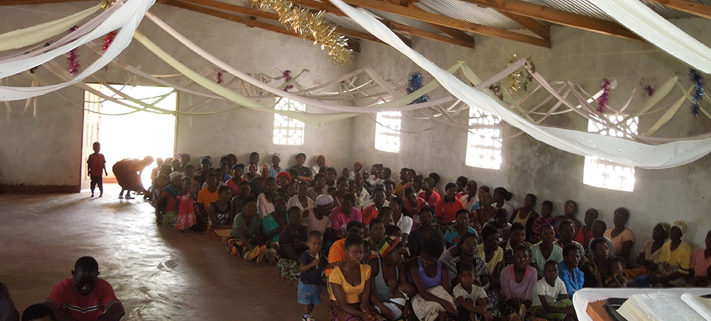A burnt-out Baptist searching for the truth discovers the gospel message in the Bible.
Ann M. Ponath
“You were a Lutheran before you knew you were a Lutheran,” Pastor Jon Scharf told Bob Finch.
Led by the Spirit, Bob was searching for the truth. But Bob turned out to be hard to find after his visit to the new church in town. Scharf also had to search for him.
The search
Bob, a purchasing manager, lives in Conyers, Georgia, 23 miles outside of Atlanta, where he was born and raised. He has been married to his high school sweetheart, Cindy, for 32 years; the couple is blessed with three children. Bob spent 49 years in the Baptist church, but he says, “As far back as I can remember I always knew Baptism was more than just for joining the local Baptist church and the Lord’s Supper was more than just something to do four times a year. I was seeking what the Holy Spirit had revealed to me from reading the Bible and letting the Word lead me, not man.”
Bob was searching the Scriptures, but he was also “nosy about the new church that was just being built.” He visited Abiding Grace, Covington, Ga., one Sunday, but he didn’t want anyone to know who he was or where he lived. Bob didn’t reckon with the friendship register.
Scharf recalls that the first time Bob visited he “snuck in right at the bell and out the same way, not giving much chance to talk other than a handshake and ‘Good morning’ on the way out.” He signed the register with only “Bob.” The second time it was “Bob . . . Conyers, Georgia.” The third time it was “Bob Finch . . . Conyers.”
“At that point, I did a quick Google search and found a couple options and picked the most likely,” says Scharf.
Abiding Grace uses the friendship register as one of its key ways to connect with visitors. “We encourage everyone to fill in all their info, hoping that guests will follow their example,” says Scharf. Once the registers are collected, Scharf highlights first-time visitors for the “mugging coordinator.” She assigns mug visits to volunteers who live near the visitor, and they drop off a thank-you package Monday night, including a coffee mug. “I then go and visit on Thursday night and try to have a conversation about the worship experience and their church background—hopefully leading into a ‘what do you believe?’ question which I can answer by taking them through a law/gospel presentation,” says Scharf.
The discovery
Scharf usually shows up unannounced for the first visit—something he also did at the Finch household. “The best part of [his] showing up at my house the first time was that I was out of town on business and my wife got to meet him for the first time because she had told me when I started to visit that she didn’t want to have anything to do with ‘that church,’ ” says Bob.
Scharf returned to the Finch home once Bob was home. “My wife still had not visited the church when Pastor came to visit, and I had to really convince her to sit in the meeting, and she did,” says Bob. “I had printed information from the different Lutheran [church] bodies. I told [Pastor Scharf] that I wanted to go over what the Lutherans are teaching.
“That opened up all kinds of discussions and questions, and my wife got in on it. The best part about talking with [Pastor Scharf] was that he never made us feel like we had been misguided, but [he] let the Word do the talking. In all the main areas I had questions, when the pastor explained them, I said, ‘That is the way I understand it too!’ ”
Scharf invited the couple to Bible information classes. Cindy joined Bob for a worship service the following Sunday, and after a couple of weeks, Bob began the 12-week class. Cindy joined later, and the couple was confirmed on Christmas Day 2011. “I remember them both really struggling getting past things they had heard all their lives and then seeing in Scripture the truth—it was fun to see the lights go on,” says Scharf. “It was interesting that the light didn’t go on at the same time for both of them on each topic. Some of the things I thought they’d wrestle with were no problem because they had already realized the false teaching they had been hearing previously. It was also so refreshing to see how passionately they wanted to get into the Word and the way that rubbed off on the whole class.”
Since that time, Bob says, “Our total outlook did a 180. I start my day with a reminder of my baptism and what Christ did for me for the forgiveness of my sins. Now for the first time in my life when someone asks me where I will go if I die today, I can say with full confidence, ‘Heaven.’ All praise to God for that!”
The opportunities
The Baptist church is a “huge” part of the church population in the South, says Scharf. “The 25- to 50-year-olds all seem to have grown up going to church on the Baptist church buses—often without parents,” he says.
But God’s Word has such grace to offer the struggling Baptist. “[Baptists] have been reminded again and again that they must be obedient—God will love them if they choose him and obey him. When God’s law proves that they are helpless in that and the gospel shows them Jesus as their substitute (not just their example)—wow!” says Scharf. “It’s fun to watch, and the energy is contagious even for someone who doesn’t know a day in his life he didn’t get that.”
Now the Finches are active members at Abiding Grace. Bob has been an elder and is now serving as secretary/treasurer, teen Bible study leader, and teen activities assistant. And things have gone full circle as Bob makes follow-up prospect visits. “His outgoing personality and her quiet faithfulness pair perfectly as they do a great job of helping other burnt-out Baptists come to grips with the fact that things they’ve thought their whole life don’t agree with Scripture, and then celebrating together the freedom of the gospel that isn’t based on our sufficient obedience,” says Scharf.
Our Spirit-led story has a happy ending: Scharf found the Finches, and the Finches discovered God’s comforting truth. Scharf says Bob’s reaction to hearing the pure Word of God was “like a breath of fresh air. He seemed so relieved that his battle with false teaching, his search for finding the truth, was finally bearing some fruit.”
Bob adds this encouragement: “Be bold in what you believe and trust daily in Christ. Always remember that the gifts God has given you need to be used for his glory and work only. We all have a daily fight with sin, but don’t forget what Christ said on the cross as he was dying for our sins, ‘It is finished!’ Amen!”
Ann Ponath is a member at Christ, North Saint Paul, Minnesota.
Do you have a manuscript, idea, or story from your own life you’d like to share for use in Forward in Christ or on wels.net? Use our online form to share it to our editorial office for consideration.
Get inspirational stories, spiritual help, and synod news from Forward in Christ every month. Print and digital subscriptions are available from Northwestern Publishing House.
Author: Ann M. Ponath
Volume 102, Number 2
Issue: February 2015
Copyrighted by WELS Forward in Christ © 2021
Forward in Christ grants permission for any original article (not a reprint) to be printed for use in a WELS church, school, or organization, provided that it is distributed free and indicate Forward in Christ as the source. Images may not be reproduced except in the context of its article. Contact us

